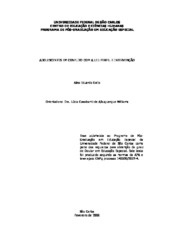Adolescentes em conflito com a lei: perfil e intervenção.
Resumo
This study belongs to a research program, driving at the development of an
adequate social repertoire, which could decrease the re-incidence of criminal
behaviour in youth. Adolescents attended in Community Services and Probation in
Sao Carlos were characterized, under objective of assessing the major number of
variables and its correlation to criminal behaviour (Study 1). Study 2 compared
these data to a similar sample at city of London, Ontario, Canada, aiming identifying
possible correlations between observed variables, in a multicultural context. Finally,
evaluated a designed intervention program to teach parenting skills to mothers of
young offenders (Study 3). Study 1 analyzed 123 protocols, in a survey design,
among those of the year 2002. The information of those protocols were tabulated
and analyzed. General results suggest that most of participants did not attend
school. Not attending school was associated to increasing number of re-incidences,
use of drugs and use of weapons. Although, participants with a lower educational
level lived with single-parents, when compared to those with a higher educational
level. Study 2 analyzed 100 protocols, in a survey design, among those referred for
evaluation to a Centre in Canada, comparing the dada to Study 1. Results showed
that adolescents in Sao Carlos dropped school earlier, because they could not follow
the classes, while Canadian schools offer a vaster services network to avoid school
evasion, like educational support programs since a problem is identified. Although,
theft was the most common crime in Sao Carlos, while Canadian society determines
that acts like butt grabbing (most common crime in London) be against the law.
Based on data found on those studies, an intervention program was designed to
teach parenting skills to ten single-mothers of young offenders. The program
consisted in 6 intervention sessions, plus five initial sessions for base-line evaluation
and five final sessions for results evaluation. The sessions worked subjects as
setting up limits, rules, and kid s antisocial behaviour functional analysis. Results
showed: participants started the program with a low self-esteem, moderate degree
of depression and problems dealing with kids. From ten initial mothers, only four
finished the program. After the six intervention sessions, mothers were again
evaluated and results showed an increasing in self-esteem, did not show depression
index and problems dealing with kids decreased. In a general way, teach parenting
skills, even in few sessions, can reduce conflicts with kids, what could decrease the risk for crimes.
